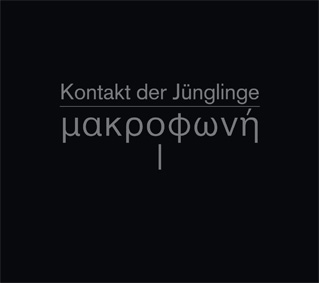Kontakt der Jünglinge, "Makrophonie 1"
 Kontakt der Jünglinge, the cross-generational collaborative project between Thomas Köner and Asmus Tietchens had a burst of activity in the late 1990s and early 2000s, but has since remained rather quiet. This album marks not only their return, but also their first true studio recording. The previous four albums were all live performances, and even the non-live disc Frühruin was actually two solo pieces composed in a similar style. In that regard, Makrophonie 1 accomplishes exactly what it should, capturing the duo’s stark, yet somehow inviting minimal electronics with a greater polish and tightened compositional sensibility that the studio setting brings.
Kontakt der Jünglinge, the cross-generational collaborative project between Thomas Köner and Asmus Tietchens had a burst of activity in the late 1990s and early 2000s, but has since remained rather quiet. This album marks not only their return, but also their first true studio recording. The previous four albums were all live performances, and even the non-live disc Frühruin was actually two solo pieces composed in a similar style. In that regard, Makrophonie 1 accomplishes exactly what it should, capturing the duo’s stark, yet somehow inviting minimal electronics with a greater polish and tightened compositional sensibility that the studio setting brings.
On the surface, the album seems as if it could be a complete 180 from what preceded it.Gone is the stark black mathematical text on white backgrounds, which more closely resembled an academic paper than an album cover.Instead it is replaced with a whole lot of black with dark gray text, and even the disc itself is black on both the playable and label surfaces.Thankfully though, the music contained within is very much consistent with the duo’s previous work.
Presented in the same fashion as the recordings from last decade, Makrophonie 1 is a single, nearly 40 minute piece of interlocking passages that bear the mark of both artists’ signature sound, but presented with the sound of a true collaboration.The extremely low frequency opening punctuated with short, noisier bursts somehow manages to be a calm introduction, even with its dissonant moments.Plinking, unrecognizable sounds and what sounds like the slightest hint of a melodic passage slip through in through these moments.
This dichotomy between the understated melodic and tasteful dissonance is a recurring theme throughout this piece, which is not all that surprising given that both Tietchens’ and Köner’s solo works are often based on the same sort of concept.Ghostly sweeps of dark, haunting tones mix with crackling, phased static early on, with both trading off to create a dramatic, swirling build of intense music that sounds richer and more fully realized than what was captured on their live collaborations.
At times there almost develops a sense of rhythm, admittedly loose and non-traditional, which harkens back to both artists’ earlier works.While it does not clearly resemble Tietchens’ early synth pop like instrumental miniatures or the deconstructed dance music of Köner’s other project Porter Ricks, shrill beeps and sub bass throbs do lock into a sort of rhythmic collage of complex noise and clinical tone.The same sub-aquatic low end processing of Porter Ricks also appears throughout, as does Tietchens’ love of intricate, almost tactile noise.
Kontakt der Jünglinge might not make the most accessible music, but for all its abstraction, Makrophonie 1 is far less abrasive and off-putting than artists working with similar sounds.Perhaps it is due to both Köner and Tietchens having worked in more traditional styles before, because there is a sense of musicality here that is buried and hidden, but undeniable in its presence.It is for this reason that this album stands out as something pleasurable to listen to, rather than a clever experiment or endurance test.
samples:
 



